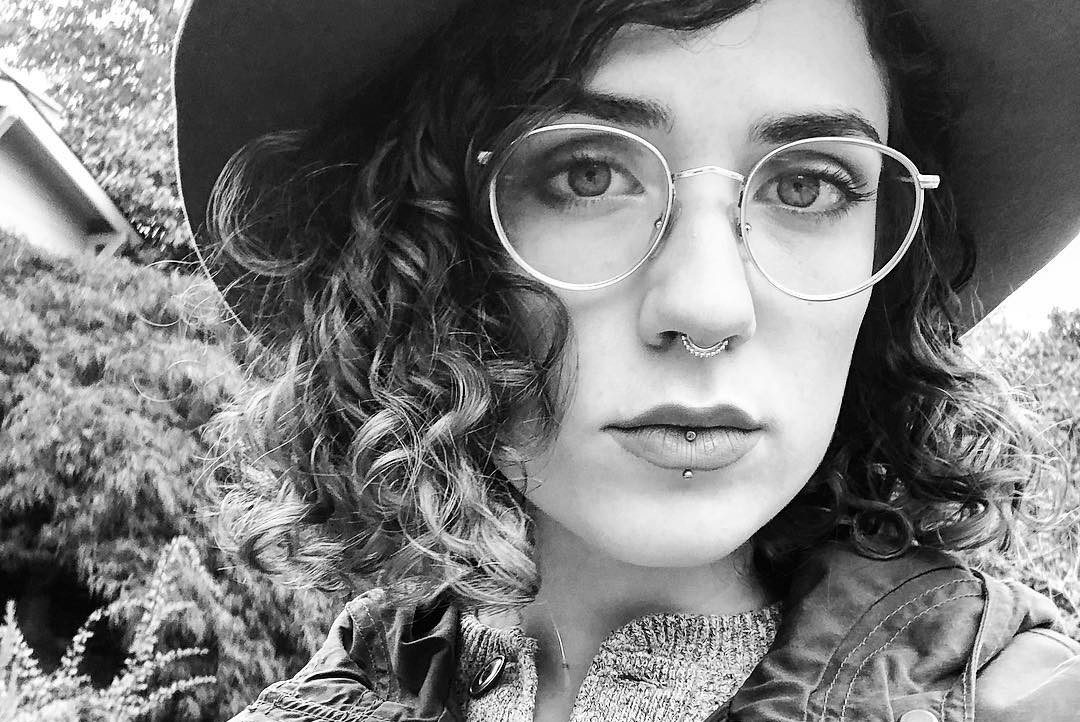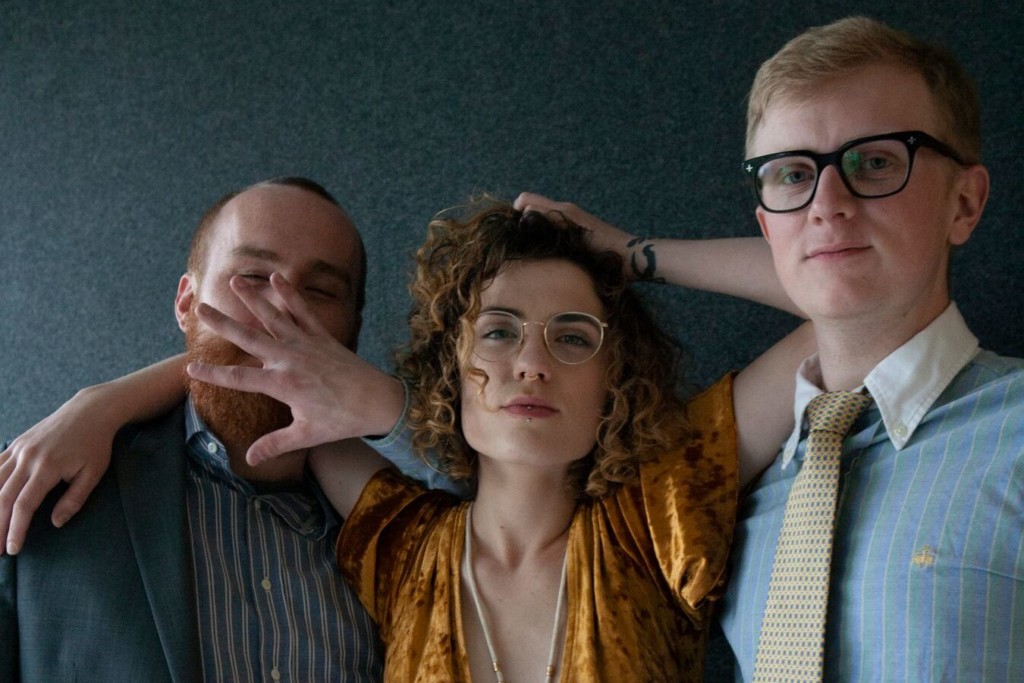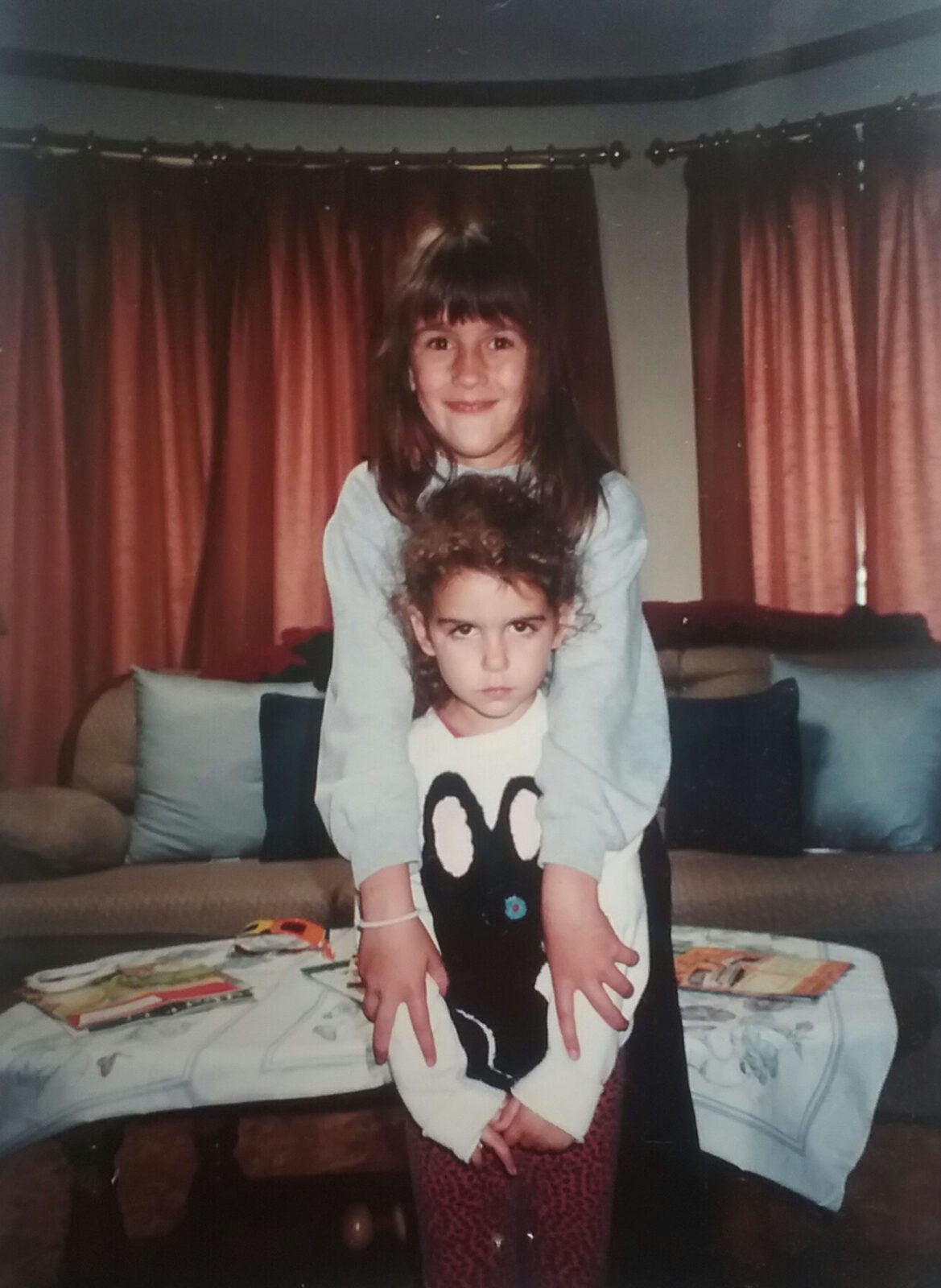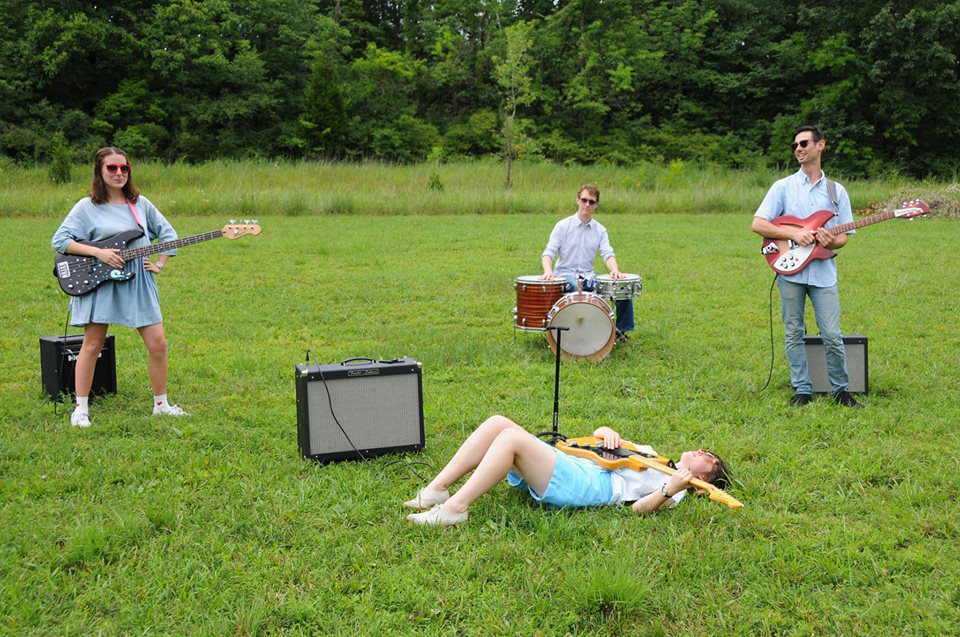
In 2013, Seattle musician Katie Kuffel broke out as a fierce-yet-tender songwriter, with artful piano skills and a husky, blues-imbued voice. She’s also made a name for herself as a community builder, organizing the Fremont Abbey Sessions in 2016—a community-driven music and video project—and striving to collaborate with and raise up local talent.
Kuffel is also a survivor. When the singer-songwriter was freshman in college, she was brutally raped and almost lost her life. With this new song and video, “Jelly Donut,” premiered with Audiofemme, Kuffel takes the time to look at her recovery in the big picture.
On “Jelly Donut,” Kuffel’s piano line repeats like the chime of a rusty church bell, and the lyrics “I don’t think about you,” also come up several times. This captures the “two steps forward, one step back” nature of her recovery, as she puts it, and the determination necessary for so many assault survivors to keep going. The video adds to this tone—a crew of roller derby skaters, the Tilted Thunder Rail Birds, glide around a dimly lit track. There are collisions and straightaways, smiles and grimaces. It’s an artful metaphor.
“I’ve been back to square one many times. That doesn’t mean I’ve failed. It means it’s a battle I’ve won before, and can win again,” she said.
Along with premiering this video, Audiofemme talked with the singer-songwriter about her recovery, why she cares about community, and how she sees Seattle’s musicians being sorely overlooked.
AF: Tell me a bit about your upbringing in Seattle — and what got you into Seattle music? Did you go see shows? How were you involved at a young age? Who/what did you listen to most in your early years?
KK: I had a pretty wonderful time growing up in the PNW. I was actually born and raised just outside of Seattle on Bainbridge Island. Small town vibe, very musically supportive family, and in a lot of ways fortunate in that I was encouraged to pursue music from an early age. I started cello when I was 8, played marimbas through middle school and high school, and also learned piano in that time as well. Music was a much needed sanctuary for me during my teen years, as it is for many.
I would often go to Seattle to see big shows at The Paramount (I recall seeing Regina Spektor, Sufjan Stevens, and Vienna Teng being among my favorites), or travel to eastern Washington to see musicians and attend festivals at The Gorge.
AF: You say it yourself—your music is a combo of a lot of different genres, and unlike anything most of us have heard before. Do you work to achieve this sound, or is it your natural output?
KK: It’d be much simpler for me I think, if I came at songwriting with any real goal in mind. I write what feels right for me, and try to be as genuine as I can. Music is my chance to be transparent, so it’s definitely something that just naturally flows from me, and because I embrace my oddity and I love change, that’s directly reflected in my output.
I have a pretty broad range of tastes as far as what I consume goes, and I love playing with others. I’ll often bring the bones of a song to my band, like lyrics and structure, then we workshop it together until it feels good to play. We all have different backgrounds, tastes, and I think it gets all mixed together to make something that I never could have arrived to on my own. We finalize songs by just performing them a ton. So in a way, our audiences also have a part to play in how it sounds in the end.
AF: Is music your full-time gig?
KK: I’m firmly in this weird, self-employed, gig economy that many twenty-somethings find themselves in. Music makes up the biggest part of my income, but I also do design work, I paint murals, illustrate, and will take random jobs as they come. Before this I was working an 8 to 5 office job for over a year, and I think it was the final push I needed to attempt being fully self-employed. I wasn’t fulfilled, I had no energy, I was running on fumes and feeling like I had no room to create. Happy to say it’s been over a year since then and I still have a roof over my head.
AF: What’s your songwriting process like? What sort of mantras do you have to help keep yourself on track creatively?
KK: It totally depends on the song. I’m definitely a lyrics-focused artist, so words are usually what I’m basing my music around. I’ve also started trying to write songs quickly, as a kind of exercise. Like… a few hours before a show quickly. It makes me less afraid of experimenting, and I think allows me to share a genuinely unique moment with my audience. I really don’t have a concrete process, but I do have some principals I like to create by.
Not everything is going to be good. But sometimes you have to unclog the drain to get started on the next thing.
No one else can create what you create. That’s both humbling and powerful. Own it.
Get out of your own way. And by this I mean, don’t put limits on the kind of songs you think you should write. In the creative arena you are all-powerful.
Not every song is meant to be shared. That’s okay.
AF: You are a very community-focused artist. Why is community important to you, and in particular, what are your goals for Seattle’s music community?
KK: I’m very thankful to the people in my life who support me, and I think I’m lucky to have landed in such a welcoming music community. Seattle’s scene is special, I believe, and people look after each other here. I think it doesn’t make sense to be competitive in music. I want to see others be successful, I want to play with people, I want to lift others up where I can, because it’s one of the few ways I know to help make the world a little more palatable. I believe music is a conduit for sharing our experiences, sharing space, and understanding that we are not alone.
AF: Many Seattle musicians are leaving the area because of cost of living and other struggles amidst the tech boom. What are your views on that? Why/how do you remain here?
KK: Seattle is choking out its creative community. It’s true, a lot of us are moving outwards, to Tacoma, or Olympia, or to new states all together. If housing costs aren’t addressed soon, if the continued indifference for protecting diverse communities isn’t addressed and the fight against Seattle’s extreme gentrification isn’t won, Seattle will lose all of its soul. I really believe this. It shouldn’t be our job to explain to a city why we matter. Why art matters. Why it is not just for your passive consumption, but a part of our collective cultural identity. Seattle used to be a city proud of its rich history in jazz and grunge, and now it feels like a lot of the tech community likes the idea of living in a “cool” city, but doesn’t want to put their money where their mouth is by going to local shows, supporting art programs, and rethinking Seattle’s archaic tax structures to serve the larger populace.
I stay because for now I can afford to. For now there are enough genuinely supportive folks and musicians here to let me forget about the overarching problems Seattle’s growth is causing. I also recognize as a white, cis woman, a lot of these issues won’t effect me as drastically as it does other minorities. This problem doesn’t just effect musicians. It effects families, it effects small business, it effects Seattle’s future. I wish I had an answer.
AF: Tell me about this new song, “Jelly Donut.” It is about recovering from sexual trauma. Will you share a bit about that context? Why did you decide to share your story?
KK: I think sharing my story played a large part in my recovery. When I was a freshman in college (before I eventually dropped out due to PTSD-related issues) I was violently raped, and nearly lost my life. Once from the incident, and once from being suicidal. It’s not something you get over, but it is something you learn to live with. Each story of rape, or recovery from sexual trauma, or abuse, is different. So know anything I say is based entirely on my own experiences, and shouldn’t be taken as a blanket statement for every survivor.
“Jelly Donut” was a song I wrote after I was able to have relationships again, after I’d gone to therapy for years, after I’d taken anti depressants, and had a toolbox of healthy coping mechanisms at my disposal. I wanted to highlight, yes that I’m alive and I’ve made it, but also memorialize in a way all of the downswings inherent in recovery. Flashbacks are common and unpredictable. Manic episodes don’t wait for a convenient time. Your brain is scarred, and sometimes those scars will flare up. In recovery I’ve lost my footing so many times, but I find my strength in knowing that those times will pass, that I have and I will be able to live to see another day, and find happiness and worth, and love. I will probably continue to stumble for the rest of my life. Maybe in moments few and far between, but that’s okay.
AF: You talk about the “cyclical nature” of recovery. What does that mean to you? How did you represent that musically on “Jelly Donut”?
KK: Recovery for many things is a two steps forward, one step back kind of deal. Or sometimes you have to start all over again. There’s a common misconception that recovery is a straight line, a linear process where the survivors gets further and further away from the incident, so they must be getting better and better in equal measure. This is false and dangerous thinking, and by refusing to acknowledge that healing is repeating the same behaviors, and understanding how your brain works, and failing then finding new ways to continue on with your life, we run the risk of punishing ourselves for an incident that was outside of our control. I’ve been back to square one many times. That doesn’t mean I’ve failed. It means it’s a battle I’ve won before, and can win again.
Musically, I love the repetition of the piano lick. It reminds me of when a record is scratched, and repeats the same line again and again. The beginning and ending also feature the same bell sound. I wanted the music to begin and end at the same place. I also repeat a lot of words over and over again in this song. Phrases like “I don’t think about you” or “I can say a lot of pretty words” and “Do you even know my name” also have that same scratched record quality. I wanted it to feel like I was struggling to even move on in the song.
AF: Tell me about the personnel on the track— where’s it recorded and who’s playing on it?
KK: So I recorded this with Johnny Bregar over at Brickyard Studios in my hometown of Bainbridge Island one sunny afternoon. It was then mixed and mastered by my two close friends Cody Kilpatrick and Hunter Rath. These three people are some of the most genuine, sensitive souls I’ve met and have had the pleasure to work with. I felt I could trust them all with a song that’s this personal.
I sang and played keys. But Jon Robinson plays bass on this track, and Jordan Wiegert plays drums. They’re part of my trio and we’ve played together for over two years. I wanted to record this song with familiar folks, friends, and peers. It was a cathartic process for me, and their support was important for the success of the track.

AF: Will “Jelly Donut” be part of a forthcoming album? If so, can we expect that to drop shortly?
KK: “Jelly Donut” is actually a one-off. It’s a song I needed to get out into the world. It felt strong enough to stand on it’s own, so no, there will be no new CD featuring this track. That does not mean there won’t be a new CD come 2020 however.
AF: What’s the future look like for Katie Kuffel? What are some goals you have for your music career?
KK: Music has always taken me to places I never expected to be. My goals are kind of loose. I don’t really want to be a famous person. I know I would make music even if no one would hear it. As long as I’m allowed to keep growing, as long as my music feels true and genuine to who I am, then I will be proud of it. Then I will trust that it will reach the people who need to hear it. Monetarily, I really just want my music to be able to support itself. To allow me to afford to keep making it. To allow me to bring it to people around the world.
Follow Katie Kuffel on Facebook for ongoing updates.




